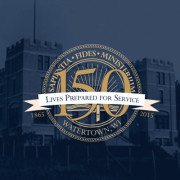Chased by demons
Many men and women in our congregations have served our country and communities with honor and distinction. Yet some suffer.
John A. Braun
All governments, ours included, call upon men and women to protect us from our enemies. The job they do often brings hidden pain.
A SOLDIER’S DUTY
For Erhard Opsahl, it started after graduating from Northwestern College in 1965. He enlisted in the army. His nephew was a conscientious objector and served as a medic but never carried a rifle. But Opsahl became a soldier and at first struggled with the Fifth Commandment. The catechism said, “Thou shalt not kill,” but training taught him to do just that and how to do it effectively. He was a soldier trained to do a soldier’s job—kill the enemy.
Can a Christian be a soldier? Opsahl read Luther and Augustine. Both provided the same answer. Murder is forbidden. Individuals may not take a life. But God entrusts the government with the sword (Romans 13:4), and the sword is not just for show. It is a weapon that brings death—a weapon for killing, if necessary.
In service to the government and obeying the Fourth Commandment—to submit to the higher authority that God has instituted—Christians can use the sword. Police officers have the same responsibility.
Soldiers and police officers use the sword—the weapon for killing—for the greater good. Luther wrote almost five hundred years ago, “What men write about war, saying that it is a great plague, is all true. But they should also consider how great the plague is that war prevents” (Luther’s Works AE 46:96). Opsahl says, “It’s my pet peeve that so many don’t understand the difference between murder—forbidden by God’s commandment—and killing by soldiers and police officers.”
A SOLDIER’S HEARTACHES
Conscience eased and trained as a soldier, Opsahl was sent to do his duty on the battlefield. He spent nine months as a mechanized infantry and scout platoon leader in Vietnam, where the demons arose that would later pursue him. “In combat, not only does one’s own life depend on one’s own actions, but so do the lives of one’s buddies,” he says. That bond is difficult for anyone who has not experienced it to comprehend. “One is willing to act in ways that are potentially hazardous to one’s own safety if the deed will help save a buddy’s or subordinate’s life,” says Opsahl. “I don’t know of a stronger bond. . . . In wartime, a buddy protecting a buddy from harm—even to the extent of giving his own life—happens frequently.”
The demons arise when those buddies are killed. Opsahl admitted it was “gut wrenching” when a buddy took a bullet in the heart. When another died, he says, “Part of my insides were savagely eaten away.” Heartache was no less severe when another was killed when a truck rolled over him two weeks before he was due to come home. Add to that the reality that Opsahl survived—sometimes by inches—while others around him died.
At the time the soldier has to move on, remembering that God must have a plan for the survivors, even in the carnage. It’s almost like the demons are locked away in the mind after the ambushes, firefights, and mines. They have little opportunity to escape and cause harm when your buddies still depend on you and you have your duty to perform.
And when soldiers come home, for some it is still moving forward. Opsahl became a career soldier. He attended the National War College, was promoted to the level of colonel, and served with many distinguished Americans in Washington. He remains amazed at what God has done in his life.
A SOLDIER’S DEMONS
Returning to civilian life means returning to a world where killing and violence are not almost daily routines. The memories of conflict and bloodshed lie hidden under layers of family, jobs, and adjustments, but they do not disappear.
Unfortunately every hour of every day vets commit suicide. The average age of these vets is 57, years after their battlefield experiences. Sometimes vets even without battlefield experiences are chased by their own demons. Post-traumatic stress disorder (PTSD) is a real problem—one that Opsahl also experiences. Remembering or retelling is like “going to the dreaded place created by the loss of my men, a hole in my heart never to be filled again” and it “is too threatening to my psyche.”
Symptoms of the disorder cause significant problems in social and work situations as well as in relationships. According to the Mayo Clinic, the problems include intrusive memories, flashbacks, disturbing dreams, and emotional distress to something that reminds the former soldier of those events. Additional symptoms include avoidance of thinking about the events or places that bring memories back, hopelessness, memory problems, irritability, aggressive outbursts, guilt, and alcohol and drug abuse. It’s a long list. Symptoms vary from individual to individual and in intensity.
When vets return to civilian life, they return to families and to our churches too. Often they receive no recognition or thanks for their sacrifice. Sometimes they face protests and rejection. After Vietnam, Opsahl crossed picket lines of protesters as he pursued his graduate studies. “We were hassled every day,” he says. In most cases those who have carried the sword of governmental authority—veterans and police officers—find little understanding of the burdens they carry.
Opsahl regularly attends a support group. It provides an opportunity to talk with other vets. He says, “Sharing one’s thoughts with other PTSD military members has the soothing effect of knowing one is not alone. It lowers, a bit, the walls one builds to protect one’s fragile ego from those who know nothing or little of the indescribable steep slope to depression.”
So what can we do as Christians? God has placed us here to love one another. It might seem a bit glib, but you can “love a vet.” Don’t forget the police officers you know—not just the vets and officers in your congregation but all those in your community. For those in our congregations, we have a special opportunity to show empathy, support, and love. Pastors, church councils, and members need to be aware of what these men and women have gone through. The full and compete forgiveness of Christ is an important antidote to the demons that lay hidden just below the surface. Don’t forget to pray for the retired and active servants of our government who carried or still carry the sword.
John Braun is the executive editor of Forward in Christ.
SUBMIT YOUR STORY
Do you have a manuscript, idea, or story from your own life you’d like to share for use in Forward in Christ or on wels.net? Use our online form to share it to our editorial office for consideration.
SUBSCRIBE TO FORWARD IN CHRIST
Get inspirational stories, spiritual help, and synod news from Forward in Christ every month. Print and digital subscriptions are available from Northwestern Publishing House.
Author: John A. Braun
Volume 102, Number 11
Issue: November 2015
Copyrighted by WELS Forward in Christ © 2021
Forward in Christ grants permission for any original article (not a reprint) to be printed for use in a WELS church, school, or organization, provided that it is distributed free and indicate Forward in Christ as the source. Images may not be reproduced except in the context of its article. Contact us





